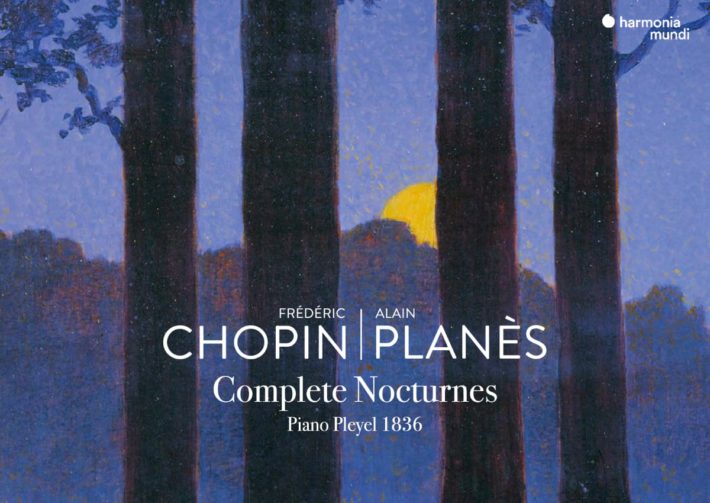The ‘Grand Patron’ Pleyel concert grand from 1836 used in this recording is closely associated with Chopin, who himself owned an instrument by this firm (albeit a smaller model). The ‘Grand Patron’ boasts what was top-of-the-line for Pleyels at the time: a double soundboard designed to produce more depth of sound. Each layer was made of a different type of wood and arranged in such a way that the woodgrains ran perpendicular to each other – an interesting parallel to the modern piano, which uses cross-stringing as a vehicle to generate resonance.
The Op. 9 B-flat minor nocturne opens the set beautifully and shows a pianist quite at home with the instrument. He features the piano’s velvety bass through the ongoing arpeggiated figures in the left hand – these play a vital role in bringing together the different parts of the nocturne. At the same time, however, he takes care to let the top line shine with fluidity and expression. Planès exhibits a deft control of the instrument’s upper register, bringing out its versatility through different aspects of the melody. Sometimes, we are drawn to its plaintive insistence (as in the first half minute) but at others, we are fascinated by its appearance as a distant echo in the wind (3’43”-4’00”).
In his notes, the pianist recommends that we listen to the E-flat major Nocturne (Vol. 1, track 8) to experience the piano’s multilayered sound. The performance brings this out nicely, as we hear several voices in conversation. In certain places, the upper tones do sound a bit thin; despite the sound limitations of the piano however, Planés still stays faithful to evoking Chopin’s signature bel canto.
Related Classical Music Reviews
- Double Review: Chopin Piano Concertos – Grosvenor, Yundi
- Review: Chopin – Complete Nocturnes – Jan Lisiecki
- Review: Four Recent Chopin Albums (2021)
Op. 48 No. 1 (Vol. 2, track 5) is one of the most challenging nocturnes and one perfectly suited to the power of the modern instrument. I was therefore curious to see how it sounded on the Pleyel and was not at all disappointed. The middle and lower registers of the Grand Patron come through impressively, giving the work the storminess it needs without any harsh edge. The credit, of course, also goes to the pianist – while the opening section is a tad fast, what I liked was how he manages the final section. Many performers choose to use the moment as a means to play up the nocturne’s drama (or perhaps their own technical prowess). Planès eschews this path, opting for a more expansive tempo that creates an expressive upper line that contrasts nicely against the inner chords. A convincing buildup to the peak that still possesses a dignified elegance.
Another perennial favorite, the final Op. posth C# Nocturne (Vol. 2, track 9) rounds out the series. As in the other Nocturnes, we can hear the effect of the double soundboard (as well as the pianist’s sensitivity to harmonic color): a warm, deep sound that envelops the listener gently. The stylistic interpretation, however, is a surprising letdown for me given the other fine performances. Perhaps it was the prevalent overuse of rubato. Downbeats in both hands are staggered too noticeably and regularly; the middle A major section should no doubt be fluid, but the phrases seem listless in their lack of shape. A more satisfying version is by Maria João Pires (DG 1996): For all its accentuated rubato and expressiveness, there is a form and flow that holds the work together cohesively.
The engineering might reflect upon performance practices of the day, where audiences sat in smaller salons and in closer proximity to the piano; The recording makes the instrument sound up-close on occasion, but generally brings out the Pleyel’s capabilities as well as the artist’s nuances. The well-written liner notes explain the very essence of the nocturnes as “night-music” and what that meant musically for the composer. The description about the Pleyel, too, is a must-read, especially for those interested in the make of the period instrument.
Despite a lone misstep, this performance sheds interesting light on how Chopin’s nocturnes might have sounded during his time. A worthy and insightful listen.

Chopin – Complete Nocturnes
Alain Planès – Piano
Harmonia Mundi, CD HMM90533233
Chopin Nocturnes – Recommended Recordings
Read more classical music reviews or visit The Classic Review Amazon store











